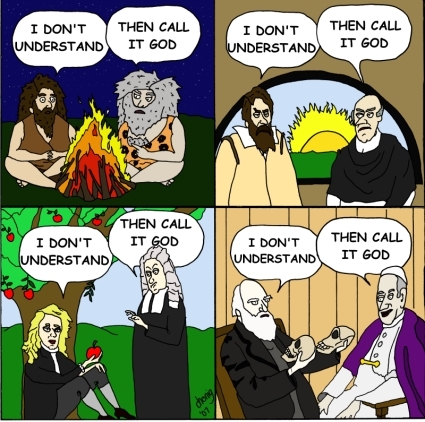
It's much better to change your point of view in response to reality, than to insist reality has got it wrong because it doesn't share your point of view.
Okay, I covered “I don’t know” briefly, but along with those three words are three that people seem even more loath to say. “I was wrong.” And when someone does figure out that they are indeed wrong, and that perhaps something else is a better answer, we have people jumping on that as some sort of mortal flaw. Being occasionally wrong, or not totally correct, is how things like science and technology gets better. Even a field like chemistry got its start in the ridiculous notion of alchemy. Yet, for all the mistakes one can historically cite in science, how many of them were brought to light through theology? Not a one. It was the self correcting mechanism of science that exposed the mistakes, and then proposed a better conclusion.
Religious scholars have a conclusion and build the evidence up to support it. Science has the evidence and builds a conclusion out of it. Then (and this is the important part), scientists do everything they can to try to disprove the conclusion. I have yet to meet a physicist who wouldn't love to be the one to show that Einstein or Hawkins' theories were garbage and here is the correct model. I have yet to meet a christian theologist who wanted to show that those Moses and Jesus guys didn't know what they were talking about and here is the correct theology.
Of course, theists don’t seem to take so kindly to scientific methodology applied to their claims. By definition, in order to hold those beliefs, they are not even allowed to contemplate that those beliefs may be wrong. Since they have no avenue to point out mistakes in their theology, they keep jumping on the bandwagon of pointing out every mistake ever made in the field of science, while they fail to grasp that not once did they actually contribute to the field. Yet the mistakes themselves were all part of the overall improvement. They will gladly enjoy the benefits, but at the same time spend all their energies on tearing it down.
So, in refusing to consider “I don’t know” and “I was wrong” into their lexicon, theists have doomed themselves into a mental dissonance that makes them challenge reality on a daily basis. It’s like science is a bold voyage to find out the unknown, with lessons in humility at every step. Yet these people so sure in their version of The Truth, would rather just have stayed home. The methods of science may not be perfect, but they are the best we have. To embrace dogma and throw away skeptical inquiry will just lead to a dark age in our history. The basic reaction of a theist to anything that challenges their belief is to suppress the idea. To a scientist, they discuss the idea and completely expose it the full rigor of science, and form a better idea.
I guess what it all comes down to, is that all that talk about having science and biblegod coexist really can’t happen. The basic starting positions are diametrically opposed. The methodologies are the inverse of each other. The fundamental claims do not in any way match. I contend (to paraphrase Carl Sagan) that it’s far better to really see the universe for what it is than to persist in delusions, no matter how comforting those delusions may seem. I don’t want to have meaning assigned to me; I would rather make meaning myself. Especially if the assigner is that biblegod bastard. I know I can do a whole lot better than him!




2 comments:
Hear, hear. I detest the willful ignorance of those who would pretend to know ("God did it") rather than admit they don't know but strive to learn.
:) Thanks Buffy. Like I said in the previous post, I suppose that a bad explanation is better to them than to admit ignorance and possibly have to work for an answer!
Post a Comment